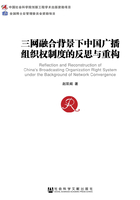
Abstract
Triple networks integration technology has brought three networks of broadcast networks, telecommunication networks and the Internet network entering into each other and penetration in the business and service level, and has brought the huge change on transmission mode of the radio and television program, revised the traditional way of radio and TV signals transmitted by broadcast network only. Telecommunication and the Internet networks became the new channels people viewing broadcasting and television program. The emergence of the triple play can meet people's need on news and information, news of entertainment and information service more conveniently and quickly, people can connected to the network and accessed radio and television program service in any way and at any time and place, thus, broadcast television's value has obtained the maximized value embodiment. However, the technology development brings convenience for us, but at the same time, it provides the technical support for the network piracy. Because of the shortcomings and defects in the broadcasting organization right system of our present copyright law, especially the anomie in the network rebroadcast or network broadcast, in the face of widespread network piracy, broadcasting organization cannot obtain the legal support. Since 1998 up to now the world intellectual property organization, held 28 sessions of conference on protection of the right of broadcasting organizations, formed a relatively complete and serial broadcasting organization right system files, but due to large disputes in many aspects among participants, especially the wide divergence on the specification of the network broadcast, so far there is no treaty decided by vote. Under such international and domestic background, this book uses the complex approach combined jurisprudence analysis and empirical analysis, comprehensively and objectively conducts the theoretical carding and concept innovation on the broadcasting organization right system. Especially, this study is based on advanced experience and concept of the legislation of broadcasting organizations right of major abroad national and international documents, which provides a broad international perspective for this study.
Through the triple networks integration technology, the connotation of broadcast obtained the unprecedented expansion. Web broadcast has various forms and is very popular, but it lacks protection in copyright law in various countries in the world. The emergence of the web broadcast will hasten the development of the network broadcast organizations inevitably. Of course, analyzed from the characteristics of“legal person”, “proposing and is responsible for”and“schedule”to judge, not all websites engaging in web broadcast are the web broadcast organizations. Countries around the world argue on whether to provide legal protection for the network broadcast, and only a few countries providing neighboring right protection for the network broadcast. Legal protection form they provided is different, such as the United Kingdom provides protection for the network synchronization transmission or real-time transmission, New Zealand provides protection for web broadcast adopting technology neutral pattern, the United States provides protection by granting copyright form, the European Union endows broadcasting organization information network transmission right and so on. In the face of international treaties lagging behind the network transmission technology requirement, each session of SCCR conference made various attempts to improve the content from, three aspects in the system level, which are the expansion of broadcasting organizations right subject, content and object. The web broadcast signal, network broadcasting organizations and network rebroadcast rights protected by the law is the focus of this books analysis. Although broadcasting organization right system based on capital and technology has the necessity of expanding, during the expansion period, the broadcast organization rights, public interests and other related obligees' benefit must keep the balance. The rational use and protection term are necessary to keep the balance. However, the triple networks integration technology poses challenges to fair use, the decrease in the public domain restricts the social innovation and development, technical protection measures makes fair use impossible and questions“fair use”, and neighboring right limit system must be comstrained by the strict three-step test and be tested by the strict inspection. At the end of this book, the author combed the past chinese copyright law, the current Chinese copyright law, and the legislative arguments on broadcast organization right system of the three copyright law drafts of the third revision, concluded and reconsidered their deficiencies and flaws, and put forward that the positioning of current broadcasting organization right system reform is to maintain the public interests, adhere to the principle of interests balancing, follow the three principles of maintaining public interests, maintaining the technical neutrality and protecting broadcast organizations, expand the existing connotation of the right of broadcast organizations, and perfect the restrictive system of broadcasting organization right.
Keywords: The Triple Networks Integration; Broadcaster's Right;Broadcast Organization; Web Broadcast; Public Interests